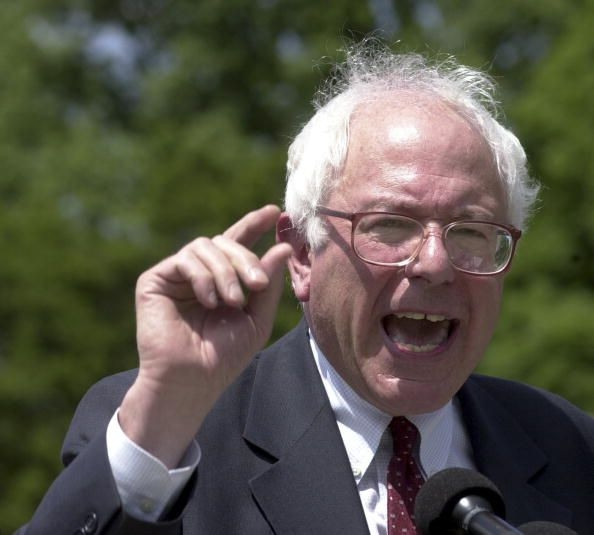Bernie Sanders And Black Lives Matter: 2016 Presidential Candidate Struggles With Topic Of Race Despite History Of Civil Rights Activism

For perhaps the first time since becoming the wildly popular liberal alternative to Democratic presidential nomination front-runner Hillary Clinton, U.S. Sen. Bernie Sanders of Vermont finds his progressive credentials have only a limited effect on today’s civil rights activists. Critics say Sanders talks mostly about socioeconomic issues and won't directly address race in a way that resonates with black and Latino activists.
For evidence, these activists point to Sanders' brief shouting match with "Black Lives Matter" protesters at a progressive politics event over the weekend. Sanders had to raise his hand to several hecklers and plead for a chance to speak about racial disparities that he said he believed were caused by decades of socioeconomic inequality. But instead of using the moment to address other issues of the day -- such as police brutality and uses of lethal force against black suspects -- the 73-year-old white, male Independent who's running as a Democrat took a trip down memory lane.
“Black lives, of course, matter,” Sanders said during a presidential candidates’ forum at the Netroots Nation conference in Phoenix on Saturday. “I’ve spent 50 years of my life fighting for civil rights and for dignity. But if you don’t want me to be here, that’s OK. I don’t want to out-scream people.”
Experts say Sanders’ campaign risks alienating the black and Latino communities if he and other candidates tiptoe around racial aspects of inequality issues. But one year after the police-involved deaths of Eric Garner in New York City and Michael Brown in Ferguson, Missouri, one glaring question has emerged: Should Sanders’ campaign count on his participation in civil rights marches and prison reform efforts decades ago to make him relevant in the Black Lives Matter era?
“The whole point of being [a white] ally is that one cannot rest on their laurels,” said Dan Berger, an assistant professor of comparative ethnic studies at the University of Washington, Bothell. “One’s credentials in that area need to be renewed and reinvigorated on a regular basis.”
Berger added: “The structures of racism are not the same as they were in 1964, during the Freedom Summer, or in 1961, when the Freedom Rides happened.”
After his standoff with Black Lives Matter activists, Sanders relented in the form of a tweet Sunday. But as of Saturday evening, a comedian had already started a trending, tongue-in-cheek Twitter hashtag -- #BernieSoBlack -- over Sanders' boasting about his civil rights activism.
Still, he is the only Democrat in the 2016 presidential field who can boast a decadeslong record on issues that would positively affect people of color.
We want a nation where young black men and women can live without fear of being falsely arrested, beaten or killed. #BlackLivesMatter
— Bernie Sanders (@BernieSanders) July 19, 2015RT @redsteeze: #BernieSoBlack that Hillary Clinton is taking his vote for granted.
— Nameless (@sockbunkilla) July 21, 2015
As early as the 1960s, when he was student at the University of Chicago, Sanders campaigned against racial segregation in public schools with the Student Nonviolent Coordinating Committee, a black-led civil rights group that worked alongside the Rev. Martin Luther King Jr. Sanders also participated in the King-led March on Washington for Jobs and Freedom in 1963.
As a member of Congress, Sanders stood against Democrats’ welfare reform movements that created barriers to vital public assistance programs in the early 1990s. He voted against tough-on-crime policies that saw millions of black and brown people arrested, jailed or left with criminal records in the late 1990s.
Most recently, Sanders has stuck to his condemnation of a system of taxation that rewards the wealthiest Americans and underfunds infrastructure programs that would ideally create jobs and lift millions of Americans into the middle class. Last year, he pledged to continue U.S. President Barack Obama’s executive action that saved hundreds of thousands of young undocumented immigrants from deportation. He is one of several supporters of legislation that would fully restore the Voting Rights Act of 1964 which, in 2013, was gutted of a provision protecting voters in Southern states from discriminatory voting laws.
“Nowadays, everybody seems to have ‘marched with Dr. King',” said Akil Houston, associate professor of African-American studies at Ohio University. “It doesn’t really matter to me who you marched with. What you are trying to do in the day-to-day?”
Houston said Sanders would do well to relate his message of socioeconomic inequality to structural racism -- a system of inequalities based on race as well as socioeconomic class. Sanders has taken that message to the conventions of the Rev. Al Sharpton-led National Action Network and the Latino group, National Council of La Raza.
But using economics as a placeholder for race isn’t going to work in today’s political and social climate, Houston added. “You can pay me now or pay me later,” he said of how Obama has continually had to address racial inequalities as commander in chief. “But you will deal with the blowback from not dealing with it.”
Berger, the University of Washington professor, said a progressive like Sanders shouldn’t struggle on a “bread and butter” issue among the liberal base. There must also be a clear acknowledgement of the racially disparate effects of socioeconomic inequality, he said.
“It’s important for progressive politicians to point to the type of country that we want to live in,” Berger said. “That’s not to say that it’s about appealing to a certain demographic in an opportunistic way. That’s something that Sanders may have learned in the civil rights movement. Racism was not a black problem, it was an American problem.”
© Copyright IBTimes 2024. All rights reserved.






















